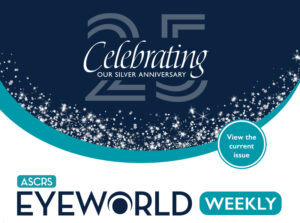
- FDA approves new multifocal IOL
- FDA approves new biosimilar
- First patient dosed in Phase 3 trial for investigational dry eye drug
- First patient dosed in Phase 2 trial investigating sustained delivery for wet AMD
- First patient dosed in Phase 2 study of small molecule to treat diabetic retinopathy
- Enrollment complete in Phase 3 trials evaluating myopia progression therapy
- Study emphasizes need for earlier glaucoma screening in black patients
- Company acquires diagnostic technology
- ASCRS news and events
August 5, 2022 • Volume 28, Number 30
FDA approves new multifocal IOL
A multifocal IOL with a segmented design—the Lenstec SBL-3 IOL—was approved by the FDA, the first of its kind in the U.S. The SBL-3 provides near, intermediate, and distance vision with improved contrast sensitivity and minimized dysphotopsias, according to the company. The company reported that the lens has four-point fixation, which affects effective lens position. The lens is available in 0.25 D increments.
FDA approves new biosimilar
Coherus BioSciences announced that the FDA approved CIMERLI (ranibizumab-eqrn) as a biosimilar that’s interchangeable with Lucentis (ranibizumab, Genentech) as an anti-VEGF therapy. According to the company’s press release, this approval is for all five indications—wet AMD, macular edema following retinal vein occlusion, diabetic macular edema, diabetic retinopathy, and myopic choroidal neovascularization. The company reported that the 0.3 mg and 0.5 mg doses will be commercially available in October 2022.
First patient dosed in Phase 3 trial for investigational dry eye drug
The first patient has been dosed in Aerie Pharmaceuticals’ COMET-3 Phase 3 registrational study evaluating AR-15512 ophthalmic solution to treat signs and symptoms of dry eye. About 460 participants in 20 U.S. cites will be enrolled and randomized to receive either AR-15512 or vehicle (control). The primary endpoint is tear production measured by an unanesthetized Schirmer’s test; dry eye symptoms based on a questionnaire will serve as a secondary measure, according to the company. This is the second of three trials in this Phase 3 program (the third will begin in the fourth quarter of 2022). AR-15512 is a TRPM8 agonist that, according to the company, acts as a cold thermoreceptor modulator, stimulating cold-sensing receptors on nerve endings within the cornea and eyelids. Stimulation of these receptors can lead to natural tear production and a cooling sensation.
First patient dosed in Phase 2 trial investigating sustained delivery for wet AMD
EyePoint Pharmaceuticals announced dosing of the first patient enrolled in its Phase 2 clinical trial evaluating Durasert with vorolanib (EYP-1901) as a possible option for sustained delivery of anti-VEGF therapy in patients with wet AMD. The study will enroll about 150 patients who will be randomized to receive one of two doses of EYP-1901 (2 mg or 3 mg) or aflibercept (control). EYP-1901 is administered in a single intravitreal injection; vorolanib is a tyrosine kinase inhibitor. The primary endpoint of the study will be change in BCVA compared to control at 6 months; secondary endpoints are change in central subfield thickness, time/need for supplemental anti-VEGF therapy, and safety.
First patient dosed in Phase 2 study of small molecule to treat diabetic retinopathy
OcuTerra Therapeutics has dosed the first patient in is Phase 2 trial evaluating OTT166 in patients with moderate to severe non-proliferative diabetic retinopathy or mild proliferative diabetic retinopathy with minimal vision loss. According to the company’s press release, OTT166 is a small molecule, selective integrin inhibitor in drop form. The company will enroll about 200 patients who will be treated with OTT166 or placebo for 24 weeks. The primary endpoint is percentage of patients who have a two-step improvement in the Diabetic Retinopathy Severity Scale. Other endpoints include prevention of progression to vision-threatening complications, delayed time to intravitreal injection or laser treatment, and exploratory imaging.
Enrollment complete in Phase 3 trials evaluating myopia progression therapy
Enrollment has been completed for Zhaoke Ophthalmology’s two Phase 3 clinical trials evaluating a myopia progression therapy, NVK002, for children and adolescents in China. A parallel Phase 3 clinical trial conducted in the U.S. and Europe with partner Vyluma is expected to be complete this year, according to the press release. An NDA submission with the FDA is expected in 2023. According to the company, NVK002 is a proprietary formulation of a low concentration of atropine. It is preservative free with a 24-month shelf life.
Study emphasizes need for earlier glaucoma screening in black patients
A study published in Translational Vision Science & Technology by researchers at New York Eye & Ear Infirmary of Mount Sinai found that, compared to white individuals, black individuals were six times more likely to experience advanced vision loss after a glaucoma diagnosis. One of the researchers said the study has “tremendous implications for glaucoma screening” for black patients. The researchers said next steps include identifying specific risk factors for different patterns of vision loss in glaucoma patients (genetic and environmental). They also said that the research “emphasizes the importance of early screening strategies” in black patients to identify early glaucoma before significant visual impact.
Company acquires diagnostic technology
LumiThera purchased MacuLogix’s assets, which include its AdaptDX Pro dark adaptometer. The company stated that this technology allows eyecare professionals to measure dark adaptation, which is used to diagnose dry AMD at earlier states. The technology, launched in 2020, is currently available in the U.S., Canada, the E.U., and other countries, according to the company’s press release. LumiThera is studying the Valeda Light Delivery System as a treatment for dry AMD. It also recently acquired the Diopsys Visual Evoked Potential and Electroretinogram vision testing technology.
ASCRS news and events
- ASCRS Summer Meeting: Register for the ASCRS Summer Meeting to get a “Taste of ASCRS”—its focused, anterior segment CME and in-person experience—August 19–21, in Nashville, Tennessee.
- ASCRS Annual Meeting: Coming soon! Call for abstract submissions for the 2023 ASCRS Annual Meeting open later this month. In the meantime, hotel reservations are open for the meeting May 5–8, 2023, in San Diego, California.
- Ophthalmology Quicksand Chronicles: Episode 3 of this popular ASCRS podcast hosted by Nicole Fram, MD, and Elizabeth Yeu, MD, is now online.
Research highlights
- Switching from bimatoprost 0.01% to 0.03% in a patient population with a broad spectrum of glaucoma diagnosis was evaluated in a real-world, single-center clinical setting. The study included 248 eyes of 143 patients who had a range of glaucoma—pigmentary, normal tension, angle closure, primary open-angle glaucoma, etc. There was a significant reduction in mean IOP from baseline to week 6 and week 12 after the switch. Patients with secondary open-angle glaucoma did not show a statistically significant reduction in IOP at either time point after the switch. There were adverse events experienced by 42 (29%) patients after the switch, with the most common being hyperemia. The research is published in Clinical Ophthalmology.
- Prefragmentation of high-grade, mature cataracts with miLOOP (Carl Zeiss Meditec) was evaluated in a retrospective comparative consecutive case series (between 2016–2020) conducted by a single surgeon, published in Clinical Ophthalmology. The study included 524 eyes where conventional lens disassembly was performed and 501 eyes where miLOOP was used. All eyes in the study had grade 3+ nuclei. There were significantly fewer intraoperative adverse events in the group that had prefragmentation with miLOOP compared to control (2.2% vs. 6.3%), and postoperative adverse event rates were comparable between the two groups. Mean ultrasound energy was reduced by 21% in the cases where miLOOP was used. The median postop BCVA was 20/25 in both groups; more than 70% of patients in both groups had a postop BCVA of 20/30 or better.
This issue of EyeWorld Weekly was edited by Stacy Jablonski and Liz Hillman.
EyeWorld Weekly (ISSN 1089-0319), a digital publication of the American Society of Cataract and Refractive Surgery (ASCRS), is published every Friday, distributed by email, and posted live on Friday.
Medical Editors: Sumit “Sam” Garg, MD, Chief Medical Editor; Rosa Braga-Mele, MD, Cataract Editor; Clara Chan, MD, Cornea Editor; Nathan Radcliffe, MD, Glaucoma Editor; and Vance Thompson, MD, Refractive Editor
For sponsorship opportunities or membership information, contact: ASCRS • 12587 Fair Lakes Circle • Suite 348 • Fairfax, VA 22033 • Phone: 703-591-2220 • Fax: 703-591-0614 • Email: ascrs@ascrs.org
Mention of products or services in EyeWorld Weekly does not constitute an endorsement by ASCRS.
Click here to view our Legal Notice.
Copyright 2022, EyeWorld News Service, a division of ASCRSMedia. All rights reserved.



